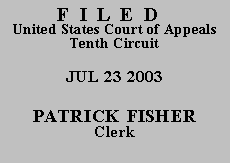

| ACIE A. ANDERSON,
Plaintiff - Appellant, Defendants - Appellees. |
No. 03-6019
(D.C. No. CIV-02-1787-F) |
The traffic stop giving rise to this case occurred on November 26, 2000. Mr. Anderson filed this action in the district court on December 18, 2002, over two years later. The district court therefore determined the action was barred by the statute of limitations, and dismissed for failure to state a claim under 28 U.S.C. § 1915(e)(2)(B)(ii). The district court also denied Mr. Anderson's motion to proceed in forma pauperis based on its finding that the appeal was frivolous and therefore not taken in good faith. Mr. Anderson renews that motion before this court.
As the magistrate judge in this case noted, this action might be broadly construed as a 42 U.S.C. § 1983 action. There is no federal statute of limitations relating to § 1983 actions. See Crosswhite v. Brown, 424 F.2d 495, 496 (10th Cir. 1970) (per curiam). The limitations period is to be determined according to the laws of the state in which the cause of action arose. Id. We therefore look to Oklahoma law, which sets a limitations period of two years for this type of action. 12 Okla. Stat. § 95.
Our review of the record confirms that Mr. Anderson referred in his initial complaint only of incidents occurring on November 26, 2000. The December 28, 2000 arrest to which he refers in his pro se notice of appeal and appellate brief was not mentioned in the district court and therefore could not form the basis for calculating the statute of limitations. Our review of the record further confirms that Mr. Anderson did not file his action in district court until December 18, 2002, more than two years after the incident mentioned in his complaint, and therefore outside the applicable statute of limitations. Accordingly, the district court properly dismissed the action for failure to state a claim on which relief may be granted.
The district court found the action was frivolous and therefore, under Neitzke v. Williams, 490 U.S. 319, 325 (1989), not taken in good faith. Rec., doc. 11 at 1. On that basis, the court denied Mr. Anderson in forma pauperis status. He has renewed his application to proceed in forma pauperis on appeal. However, because he has not shown the existence of a reasoned, nonfrivolous argument on the law and the facts in support of reversing the district court's dismissal of his action, we deny him in forma pauperis status. See DeBardeleben v. Quinlan, 937 F.2d 502, 505 (10th Cir. 1991).
The district court provided an alternative ground for dismissal based on Mr. Anderson's failure to allege a provision for its jurisdiction as required by Rule 12(h)(3). Because we agree with the first ground for dismissal, we do not reach this alternative reasoning.
Accordingly, we DENY the motion to proceed in forma pauperis and DISMISS the appeal.
ENTERED FOR THE COURT
Stephanie K. Seymour
Circuit Judge
*.After examining appellant's brief and the appellate record, this panel has determined unanimously that oral argument would not materially assist the determination of this appeal. See Fed. R. App. P. 34(a)(2) and 10th Cir. R. 34.1(G). The case is therefore submitted without oral argument. This order and judgment is not binding precedent, except under the doctrines of law of the case, res judicata, and collateral estoppel. The court generally disfavors the citation of orders and judgments; nevertheless, an order and judgment may be cited under the terms and conditions of 10th Cir. R. 36.3.